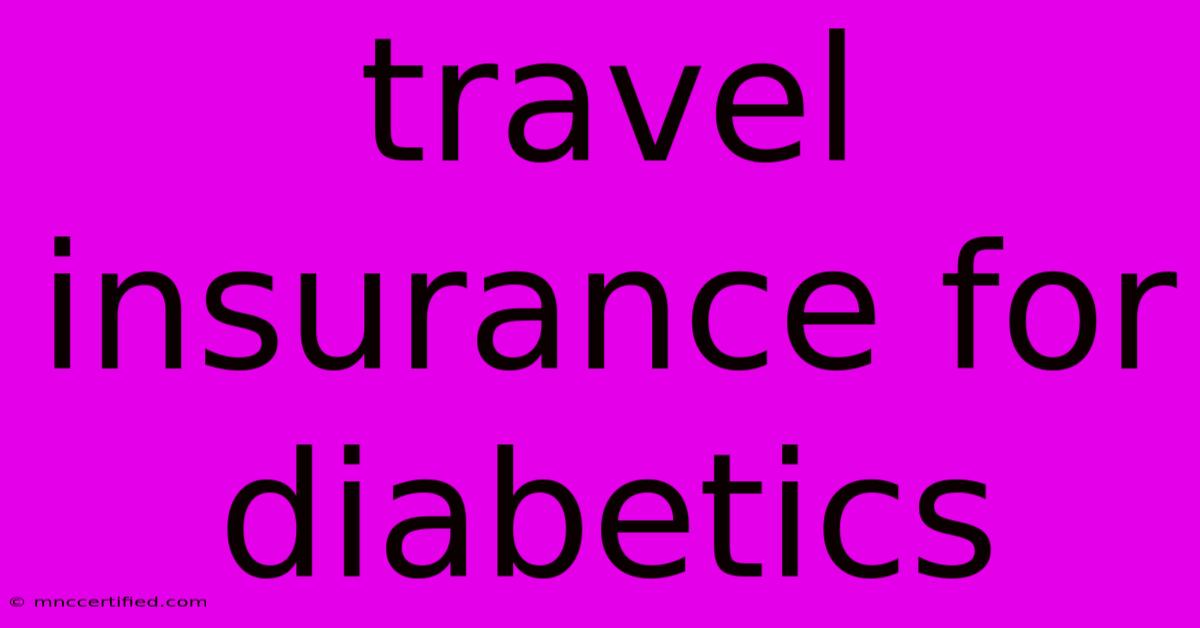Travel Insurance For Diabetics

Table of Contents
Travel Insurance for Diabetics: A Comprehensive Guide
Traveling with diabetes requires careful planning, and securing the right travel insurance is paramount. This comprehensive guide will explore the nuances of travel insurance for diabetics, helping you navigate the complexities and find the best coverage for your needs. We'll cover essential considerations, crucial questions to ask insurers, and tips for a smooth and safe trip.
Understanding the Unique Needs of Diabetic Travelers
Diabetic travelers face unique challenges that standard travel insurance policies might not fully address. These include:
- Medical emergencies: Hypoglycemic (low blood sugar) or hyperglycemic (high blood sugar) episodes can occur unexpectedly and require immediate medical attention, potentially including hospitalization, specialized treatment, and medication.
- Medication management: Carrying sufficient insulin, syringes, glucose monitoring supplies, and other necessary medications requires careful planning and protection against loss or damage.
- Evacuation and repatriation: In severe cases, emergency medical evacuation or repatriation to your home country might be necessary, adding significant costs.
- Pre-existing conditions: Diabetes is often considered a pre-existing condition, meaning standard policies might exclude or limit coverage for related complications.
Finding the Right Travel Insurance: Key Considerations
Choosing the right travel insurance for diabetics requires careful research and attention to detail. Here are crucial aspects to consider:
1. Pre-existing Condition Coverage: Absolutely Essential
This is the most crucial factor. Many standard policies exclude pre-existing conditions, meaning your diabetes-related medical expenses wouldn't be covered. Look for policies that explicitly cover pre-existing conditions, ideally with no exclusions or limitations for diabetes-related issues. Some insurers may require a medical questionnaire, be prepared to provide detailed information about your diabetes management.
2. Emergency Medical Evacuation and Repatriation: Vital Protection
This coverage is vital, especially for trips to remote locations or countries with less developed medical infrastructure. Ensure your policy covers the costs of emergency medical evacuation to a suitable medical facility and repatriation to your home country if necessary.
3. Medical Expenses: Sufficient Coverage Amounts
Diabetes-related medical emergencies can be expensive. Check the policy's limits on medical expenses and ensure it's sufficient to cover potential costs, including hospitalization, specialized treatment, and medication. Consider higher coverage than you might for a non-diabetic trip.
4. Lost or Damaged Medical Supplies: Don't Overlook This
Losing or damaging essential medication, insulin, or monitoring equipment can be a serious problem. Look for policies that cover the replacement cost of these supplies.
5. 24/7 Emergency Assistance: Peace of Mind
Having access to 24/7 emergency assistance is invaluable. This allows for quick help with medical emergencies, lost luggage, or other unexpected events. Check the insurer’s reputation and the ease of access to their assistance services.
Questions to Ask Your Insurer
Before purchasing a policy, don't hesitate to contact the insurer directly and ask clarifying questions, such as:
- What specific conditions related to diabetes are covered?
- Are there any exclusions or limitations related to diabetes?
- What is the maximum coverage amount for medical expenses?
- What is the process for claiming expenses related to diabetes?
- What is the process for replacing lost or damaged medical supplies?
- What is the coverage for emergency medical evacuation and repatriation?
Tips for a Smooth Trip
- Carry sufficient medication: Ensure you have enough medication for the entire trip, plus extra in case of delays.
- Inform your insurer of your travel plans: Provide them with your itinerary and contact information.
- Keep a record of your medical information: Carry a copy of your medical history, medication list, and doctor's contact information.
- Pack your medical supplies securely: Protect your insulin and other medical supplies from damage or loss.
- Learn basic phrases in the local language: Knowing how to communicate your needs in case of a medical emergency can be invaluable.
Conclusion
Traveling with diabetes doesn't have to be daunting. By understanding your needs, selecting the right travel insurance, and taking necessary precautions, you can enjoy a safe and memorable trip. Remember, thorough research and proactive communication with your insurer are key to securing the best possible coverage and peace of mind. Don't compromise on your health and safety – invest in comprehensive travel insurance tailored to your specific needs as a diabetic traveler.

Thank you for visiting our website wich cover about Travel Insurance For Diabetics. We hope the information provided has been useful to you. Feel free to contact us if you have any questions or need further assistance. See you next time and dont miss to bookmark.
Featured Posts
-
How Does Lyft Verify Insurance
Nov 27, 2024
-
Feyenoord Stuns Man City 3 Goal Comeback
Nov 27, 2024
-
Does Insurance Cover Otoplasty
Nov 27, 2024
-
Flaggs Highlight Dunk Vs Kansas
Nov 27, 2024
-
Flaggs Insane Dunk Vs Kansas
Nov 27, 2024